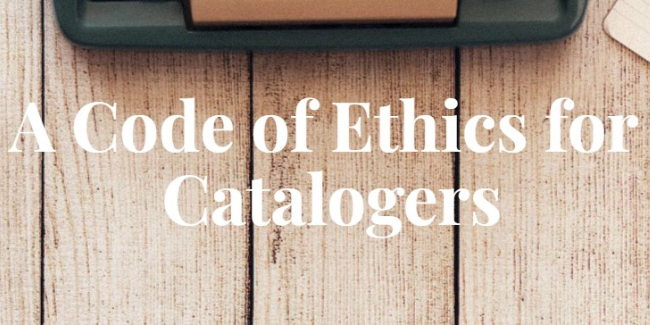
By Jane Daniels
29 June 2022
CILIP has endorsed the Cataloguing Code of Ethics following a decision by the Board of Trustess in spring.
The Code is the product of a joint initiative, which commenced in April 2019, spearheaded by the cataloguing and metadata special interest groups of the American -Library Association CaMMS (now CORE),
¬Canadian Federation of Library Associations-Fédération canadienne des associations de bibliothèque (CFLA-FCAB) and CILIP CIG (now MDG). The document focuses on the unique ethical dilemmas faced by cataloguers and metadata managers
working in GLAM or for the companies that sell systems, content or metadata to the education, cultural or heritage sectors.
Authored by the Cataloguing Ethics Steering Committee, it is informed by the experience of over 70 volunteers from the international cataloguing community who produced reports on six key areas for the Cataloguing Ethics Steering Committee.
Areas examined are authority work, classification, subject headings and controlled vocabularies, access scope and infrastructure, staffing/working conditions and resource discovery and access.
The Code includes 10 statements of ethical principles intended to aid the examination and formation of cataloguing policy and practice to ensure that resources can be found and accessed by everyone.
Alan Danskin, Metadata Standards Manager, British Library said: “It has encouraged dialogue between different communities and fostered awareness and better understanding of EDI issues in particular. I have mapped the principles to our
institutional values as a step towards embedding meaningful ethical guidelines in our daily practice.”
Whilst Debbie Lee, Senior Teaching Fellow, Department of Information Studies, University College London, commended the Code for use in cataloguing and metadata management courses. “It sets out the broad ethical considerations of cataloguing
work, and is a really useful tool for those learning to catalogue, index and classify. It demonstrates how cataloguing ethics goes beyond just the catalogue itself, and how ethics impacts on the wider profession.”
ALA endorsed the Code in November 2021 and once approved by the Canadian federation the document will be presented to IFLA to seed discussions regarding the creation of an international Cataloguing Code of Ethics.
Further information regarding the Code, CESC, the working groups and the open call for short case studies, describing ethical issues encountered and how these were resolved, can be accessed via the Cataloguing Ethics Steering Committee website.




